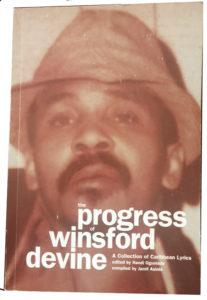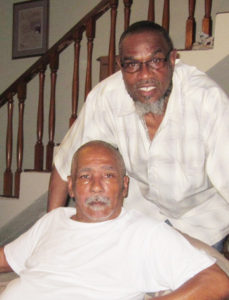By Lincoln DePradine

In 2006, a ceremony was held at the Scarborough headquarters of Tropicana Community Services – then located at Progress Avenue – to launch “The Progress of Winsford Devine: A Collection of Caribbean Lyrics’’.
The book, published by Mayaro Imprint, documents the many classic calypsoes– including King Austin’s “Progress’’, Mighty Trini’s “Sailing’’, and Sparrow’s “Phillip, My Dear’’ – that were written by Devine.
The composer, who was born August 1943 in Morne Diablo in south Trinidad, died Tuesday. He was 77.
Devine’s talent came to the fore after he moved to Nelson Street, Port of Spain, in 1968. He joined the Blue Diamond Steel Orchestra as a tenor player, and then became the band’s arranger. He soon turned to writing and singing calypsoes. He said he abandoned singing after being told he wasn’t good at it. However, Devine continued writing and did so for half of a century, penning more than 600 calypso and soca songs.

Early in his composing career, Devine took a tape with his songs to several calypsonians, including Sparrow, popularly known as “Calypso King of the World’’. Sparrow, Devine said, bought some of the songs and gave him $360.
“Is the biggest money I ever get. I feel it was the world of money,’’ Devine recalled. “I wrote for Sparrow for 17 years unbroken until we had a falling out. The falling out was over the double album because I wrote nine songs. He paid me for six songs.’’
Apart from Sparrow, King Austin and Mighty Trini, Devine also wrote songs for Crazy, Blaikie, Baron, Explainer, Machel Montano, Francine, Singing Sonia, Protector, and Scrunter.
Heightened interest in Devine, as a composer and his contribution to calypso, was sparked by the publication of “The Progress of Winsford Devine’’, a book which this writer had a hand in compiling.
“Not every Devine lyric is profound nor every rhythm sweet, but cushioned within his 600-strong catalogue are timeless gems that have influenced cultural movements, shaped political thought and fuelled this nation’s propensity for bacchanal. Arguably, it is Devine’s anthems that have most accurately reflected the pulse of three generations of Trinbagonians,’’ wrote Nandi Jacob-Ogunlade in the book that was instrumental in him being awarded a Doctor of Letters from the University of West Indies (UWI) 2017.
Devine, once asked about what he considers his greatest composition, said it was “Somebody’’, which was made famous by Baron. He rates it above all others because “Somebody’’ was played by 28 steelbands at panorama in Trinidad and Tobago.
However, the consensus among many calypso and soca lovers and followers of the art form is that “Progress’’ is Devine’s – and calypso’s – best-ever composition.
The chorus to “Progress’’: “It is plain to see, universally, this land is not bountiful as it was, simply because, in his quest for success, nothing stands in man’s way; old rivers run dry, soon the birds won’t fly. The mountains will be no longer high, and when I really think of it, I does wonder why, oh why.’’


